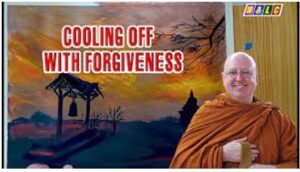Chương 4: Làm Nguội Bằng Tha Thứ – Cooling off with forgiveness – Song ngữ
English: Ajahn Brahm
Việt ngữ: Chơn Quán Trần-ngọc Lợi
Compile: Lotus group

Chương 4: Sân Hận Và Tha Thứ – Anger and Forgiveness
34. Cooling off with forgiveness – Làm Nguội Bằng Tha Thứ

When someone has hurt us, we don’t have to be the one who punishes them. If we are a Christian, a Muslim or a Jew, surely, we would believe that God will punish them enough? If we are a Buddhist, a Hindu or a Sikh, we would know that karma will provide our assailant with their just deserts. And if you are a follower of the modern religion of psychotherapy, you know that your assailant will have to go through years of expensive therapy because of their guilt!
Khi bị ai làm hại ta không cần phải trả đũa. Nếu là tông đồ của đạo Chúa, Hồi hay Do Thái, bạn tin rằng họ bị Đấng Thiêng Liêng phạt rồi. Nếu theo đạo Phật, Ấn hay Sikh, bạn biết rằng kẻ làm ác không sao tránh khỏi ác nghiệp. Còn nếu là người theo đạo “Tâm lý liệu pháp” hiện đại, bạn chắc rằng người ấy sẽ tốn một số tiền lớn hơn và nhiều năm dài để nhờ bác sĩ chữa trị tâm thần vì mặc cảm tội lỗi.
So why do we have to be the one who ‘teaches them a lesson’? Considering wisely, we discover that we don’t have to be the executioner. We are still doing our public duty when we let go of our anger and cool off with forgiveness.
Do đó bạn đâu cần “dạy họ một bài học” làm chi. Sáng suốt mà nhìn chúng ta thấy mình không cần làm quan tòa. Bằng buông xả và tha thứ chúng ta vẫn làm đầy đủ trách nhiệm công dân như thường.
Two of my fellow Western monks were having an argument. One of the monks was a former US marine who had fought as a ‘grunt’ (frontline soldier) in the Vietnam War and had been badly wounded. The other had been a very successful businessman who had made such a large amount of money that he had ‘retired’ in his mid-twenties. They were two clever, strong, extremely tough characters.
Tôi có hai bạn tu người Phương Tây. Một sư từng phục vụ trong binh chủng Thủy Quân lục chiến Hoa Kỳ bị thương trong một trận đụng độ tại Việt Nam. Sư kia là một cựu thương gia rất thành công và “về hưu” lúc tuổi mới 25 cả hai đều lanh lợi, thẳng tánh và “chì”.
Monks aren’t supposed to have arguments, but they were. Monks aren’t supposed to have fist fights, but they were about to. They were eyeball to eyeball, nose to nose, and spitting anger. In the midst of a ferocious verbal exchange, the former marine got down on his knees and bowed gracefully to the shocked ex-businessman monk. Then he looked up and said, ‘I’m sorry. Forgive me.’
Các sư được dạy không nên cãi cọ hay đánh đấm nhưng hai sư này đang tranh cãi xém thoi nhau. Họ rất phẫn nộ. Trong lúc họ đang lời qua tiếng lại, nhà sư gốc lính bỗng sụp quỳ xuống chân nhà sư gốc thương gia và ngẩng đầu lên nói: “Xin lỗi sư. Xin sư tha thứ cho tôi”
It was one of those rare gestures that come direct from the heart, which are always spontaneous and inspirational rather than planned. They are recognizable by their immediacy, and their being totally irresistible. The ex-businessman monk wept.
Cử chỉ và lời nói ông phát xuất tự đáy lòng – tự nhiên và thành thật – khiến sư kia không cầm được nước mắt sau phút ngẩn ngơ.
A few minutes later they were seen walking together as friends. Monks are supposed to do that.
Sau đó hai sư cùng sánh bước, bước đi của bạn tâm giao. Sư phải là như vậy đó.
Sources:
Tài liệu tham khảo:
- https://tienvnguyen.net/p147a881/chuong-4-
- https://www.bps.lk/olib/bp/bp619s_Brahm_Opening-The-Doors-Of-Your-Heart.pdf
- https://www.boldsky.com/relationship/marriage-and-beyond/2016/why-do-indian-couples-fight-099766.html
- https://www.roberthalf.com/blog/job-interview-tips/5-ways-to-answer-whats-your-reason-for-leaving-your-job
- https://modernanalyst.com/Resources/Articles/tabid/115/ID/5065/Why-Problems-and-Opportunities-are-NOT-the-same-for-projects.aspx
